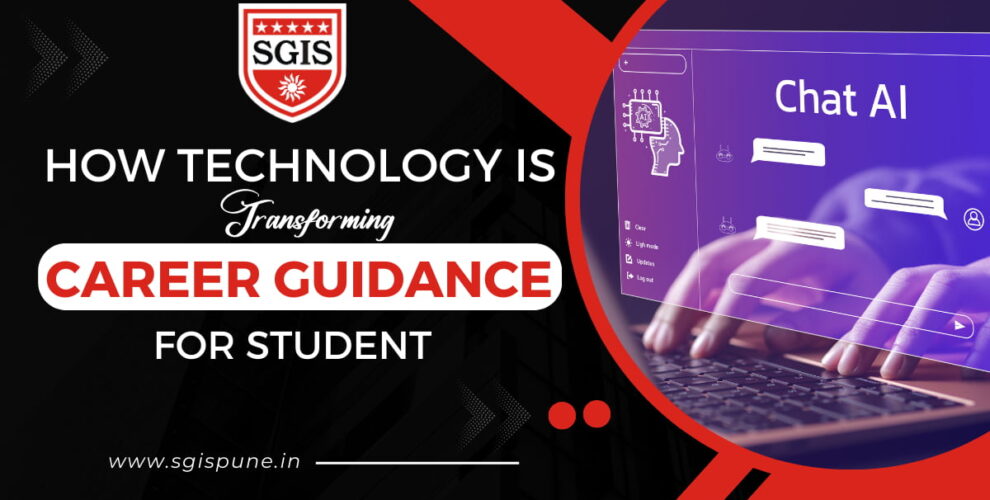Selecting the appropriate career path is one of the most vital decisions students will make in their lives. Nowadays, due to the power of technology, the approach toward career counseling has seen a tremendous shift. The introduction of online tools and channels is shaping the landscape of student career guidance and making it even more reliable, accessible, and customized to personal requirements. Also, these tools serve as a basis for supporting students navigate their professional journeys in life. In this blog, we will look at some of the key technologies that are responsible for transforming career guidance for student.
Revolutionizing Career Guidance: How Technology Empowers Students to Shape Their Future
Career Counseling and the Impact of Technology on Student Guidance
Career counseling for students is necessary because it supports them in understanding their flaws and strengths, knowing their areas of interest, and providing them with channels needed to make informed decisions about their future. Effective career counseling can stop students from making impulsive judgments that might lead to career dissatisfaction or job changes later in life.
Over the years, career counseling has evolved significantly. Earlier, traditional approaches mainly depended on in-person meetings and paper-based assessments, whereas today’s methods incorporate technological advancements that allow students to get more customized and effective assistance.

Key Technologies Shaping Career Counseling
Here is a comprehensive overview of technologies that are transforming the career counseling landscape for students:
1. Online Assessment Tools
A major development in career counseling is the introduction of online assessment tools that help evaluate students’ skills, interests, and personality traits. Various platforms provide individuals with insights into their preferences and potential career paths. By using these tools, counselors can quickly gather essential information that enables them to offer a more personalized counseling experience.
2. Virtual Counseling Sessions
The popularity of video conferencing platforms such as Zoom and Microsoft Teams has changed the way career counseling is delivered. Virtual sessions offer flexibility, overcoming geographic limitations and facilitating more frequent interactions. For example, students in rural areas can now easily connect with experienced career counselors from larger cities which eliminates the need for travel.
3. Career Guidance Software
Career guidance software plays a crucial role in student career development. Platforms like Career Coach or CCHS help manage client progress, appointments, and records. By utilizing such software, counselors can focus more on delivering valuable services rather than dealing with administrative tasks.
4. Data Analytics in Career Counseling
By studying trends and results, counselors can make informed decisions to enhance their service. For instance, if counselors see that students with specific personality features often succeed in particular fields, they can adjust their approach.
5. AI-Driven Career Guidance
Artificial intelligence is becoming a key element in career counseling for students. AI-powered tools like chatbots and virtual career advisors can handle routine inquiries, offer personalized suggestions, and even provide real-time feedback.

Benefits of Incorporating Technology in Career Counseling for Students
Technology has a huge role to play in career guidance for student. Here are some of its key benefits:
- Increased Accessibility: Technology develops access to career guidance for students, particularly in remote or rural locations. Through online consultations, counselors can assist students who might face obstacles to accessing traditional counseling.
- Improved Student Engagement: Interactive tools and resources can significantly boost student involvement in counseling sessions. For example, career software allows students to visualize their career journeys which makes the counseling experience more engaging and insightful.
- Enhanced Efficiency and Time Management: With the help of appropriate counseling, students can effectively manage their tasks. They can give more time to areas where they lack efficiency and make their concepts clear.

Challenges and Considerations
Here are some of the key elements of technology that need to be considered in student career development:
- Technical Skills Needed: While technology brings numerous benefits, it also requires students to develop technical expertise. They must be proficient in using various digital tools.
- Adaptation: Not all students may be familiar with or comfortable using technology, or with digital platforms. Therefore, they need to be patient while adjusting to new tools.
- Maintaining Human Connection: Despite the advantages of technology, it is crucial to preserve the human aspect of career counseling. Building connections and understanding students’ emotions are essential for effective counseling, and technology should not replace human interactions.
Conclusion
The impact of technology on modern career counseling for students is significant. From online assessments to AI-powered insights, technology is enhancing the reach and effectiveness of career counseling to students in different corners of the world.
At Sanjay Ghodawat International School, Pune, recognized as the best school in Pune, we understand the significance of guiding students toward their career paths, and we comprehend the power of technology to make this process more personalized and effective. By integrating advanced instruments like online assessments, virtual counseling sessions, and AI-driven career guidance, we make sure that every student receives the support they need, no matter where they are.
Also read – 10 Benefits of Comic Books for Children






Leave a Reply